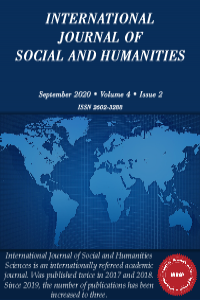Abstract
References
- Aronin, L (2018). What is Multilingualism? ResearchGate.
- Cenoz, J. (2013). Defining Multilingualism, ResearchGate.
- Chiweshe, M.K. (2019).Fourth Industrial Revolution: What's in it for African Women? Policy Briefing, Women, Power and Policy Making, African Portal.
- Claude, R. (2018). Organizational Factors and Competitiveness: A Case Study of Medium and Large Manufacturing Enterprises in Rwanda, Journal of Business and Financial Affairs, 7.4.
- European Commission, (2007). Final Report: High Level Group on Multilingualism, Luxembourg, European Communities, http://ec.europa.eu/education/policies/lang/doc/, retrieved 11 June 2020.
- Grishaeva, E.B. (2012). Multiculturalism as a central Concept of Multiethnic and Polycultural Society Studies, Journal of Siberian Federal University, Humanities and Social Sciences, Vol.7. Iss.5.
- Hebron, L., and Stack Jr,J.F. (2013). Globalization: Debunking the myths, Dorli Kindersley, India Pvt, Ltd.
- Fletcher, M., Harris, S., and Richey, R.G. (2013).Internationalization of Knowledge: What,Why,Where, and When? ResearchGate.
- Li, W., and Moyer, M. (Eds).(2008). The Blackwell Handbook of Research Methods on Bilingualism and Multilingualism, Oxford, UK, Blackwell.
- Moawad, N.M.I and El Shoura, S.M. (2017). Toward a Richer Definition of Multiculturalism, International Journal of Advanced Research, 5(7).
- Rosado, C. (1997). Towards a Definition of Multiculturalism, Rosado Consulting, Retrieved 21/06/20 http://www.rosado.net/pdf/def of multiculuralism.pdf
- Yalcin, B. (2018). What is Globalization? ResearchGate.
Abstract
This paper argues that the phenomenon of globalization, internationalization, migration and the Fourth Industrial Revolution Era require cooperation and partnerships with the diverse population of the world for the organization to survive. Multilingual and multiculturalism philosophy ensures that organizations gain positions of enduring superiority over competitors. International trade depends on the organization’s effective communication skills and how it embraces cultures across the globe. Business environments are dynamic, consumers mobile in search of opportunities and better livelihoods and thus in this global village, investment numerous languages implies embracing all types customer. The philosophy must be fused into business policy as a well of embodying the universalism and international outlook. Organizations such as passenger airlines, road passenger transport, rail passenger and hotels require employees who are able to converse in numerous languages with a clear understanding of other people’s way of life. Multilingual and multiculturalism philosophy are a key to global peace, and organizational success story. This was a case study of passenger transport organizations in Zimbabwe, whose target population was three hundred companies. A sample size of one hundred was randomly selected for representativeness. Both qualitative and quantitative instrumentation were used. The study found out that 90% of the respondents had no employees who were able to speak more than one other foreign languages other than English and their vernacular. This affected contract agreements with other international companies and had to rely on hired interpreters or translators who charged exorbitant fees which affected their profit margins. The study recommends capacity building of all employees for them to embrace new business phenomena.
Keywords
Multilingual and multiculturalism Globalization Internationalization Organizational competitiveness
References
- Aronin, L (2018). What is Multilingualism? ResearchGate.
- Cenoz, J. (2013). Defining Multilingualism, ResearchGate.
- Chiweshe, M.K. (2019).Fourth Industrial Revolution: What's in it for African Women? Policy Briefing, Women, Power and Policy Making, African Portal.
- Claude, R. (2018). Organizational Factors and Competitiveness: A Case Study of Medium and Large Manufacturing Enterprises in Rwanda, Journal of Business and Financial Affairs, 7.4.
- European Commission, (2007). Final Report: High Level Group on Multilingualism, Luxembourg, European Communities, http://ec.europa.eu/education/policies/lang/doc/, retrieved 11 June 2020.
- Grishaeva, E.B. (2012). Multiculturalism as a central Concept of Multiethnic and Polycultural Society Studies, Journal of Siberian Federal University, Humanities and Social Sciences, Vol.7. Iss.5.
- Hebron, L., and Stack Jr,J.F. (2013). Globalization: Debunking the myths, Dorli Kindersley, India Pvt, Ltd.
- Fletcher, M., Harris, S., and Richey, R.G. (2013).Internationalization of Knowledge: What,Why,Where, and When? ResearchGate.
- Li, W., and Moyer, M. (Eds).(2008). The Blackwell Handbook of Research Methods on Bilingualism and Multilingualism, Oxford, UK, Blackwell.
- Moawad, N.M.I and El Shoura, S.M. (2017). Toward a Richer Definition of Multiculturalism, International Journal of Advanced Research, 5(7).
- Rosado, C. (1997). Towards a Definition of Multiculturalism, Rosado Consulting, Retrieved 21/06/20 http://www.rosado.net/pdf/def of multiculuralism.pdf
- Yalcin, B. (2018). What is Globalization? ResearchGate.
Details
| Primary Language | English |
|---|---|
| Journal Section | Research Article |
| Authors | |
| Publication Date | September 30, 2020 |
| Published in Issue | Year 2020 Volume: 4 Issue: 2 |


